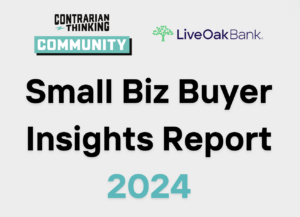
Have you ever thought about just how much of your life relies on functional plumbing?
Toilets.
Sinks.
Dishwashers.
Septics/sewers.
Washing machines.
When these break, you’re temporarily transported right back to the 1800s.
That’s what makes plumbing a brilliantly simple business concept: every single one of us uses it and relies on it daily.
When it leaks or malfunctions, most people have no clue what caused the problem, and they sure as hell don’t know how to fix it.
Sure, you could start your own plumbing business to tap into pretty much consistent demand.
But you’ll have to compete against established players with a backlog of customers. You’ll also need to figure out how to balance your plumbing workload with operations and marketing.
A better option for most newcomers is to buy an existing business and modernize it instead.
Many plumbers are behind the times. They don’t have up-to-date CRMs, booking software, or online payment processing. And plenty of them stay fully booked without it.
But if you can step into a business that’s already making money, streamline its operations, and provide outstanding customer service? That puts you in a position to take your market by storm.
Buying a Plumbing Company Vs. Starting One

Existing plumbing companies have a lot going for them, even if their systems or marketing are stuck in the 1980s.
Here are 6 reasons it might make better sense to buy a plumbing company rather than starting your own:
- You’ll avoid the chaos of juggling operations and marketing in the initial phase.
- You get immediate access to specialized equipment and certified professionals.
- You can leverage the existing customer base.
- You can immediately focus on improvements that enhance profitability.
- You start with some operational processes in place.
- You may not know anything about plumbing, in which case a staff of trained pros makes a huge difference.
Buying an established plumbing company isn’t a pipedream, either.
Plenty of plumbers want to pass the torch to someone new and move on to retirement. You can find tons of business owners who want to sell on marketplaces like BizBuySell or BizQuest.
And that’s not counting the off-market deals you can find by reaching out to business owners or using tools like BizScout. (Full disclosure: We own BizScout, but it’s a great tool for entrepreneurs who want to find their next business.)
And you can negotiate a seller financed deal for one of these companies. With a low down payment, you can start making cash and pay back the previous owner through a portion of the profits.
But this is the guide for you if you still want to get knee-deep in this market by starting your own plumbing company. Here’s what it takes:
- Researching your market
- Drafting a business plan
- Addressing legal requirements
- Planning your finances
- Hiring and training your team
- Marketing your business
- Managing operations
1. Research Your Market
In general, you might choose one or a combination of the following three services:
- Residential plumbing
- Commercial plumbing
- Industrial plumbing
Another key distinction worth learning is that plumbers and plumbing contractors are not one and the same.
A plumber deals mostly with problems in existing plumbing, whereas a plumbing contractor works with renovations and new construction. Your team of plumbers could include both types.

Before starting your new plumbing business, you must know the lay of the land. Determine your competition, their unique value proposition, and their pricing. This will serve as the basis for your own financial plan.
Note any underserved niches, as this may be an opportunity for you to specialize.
For example, you might offer green plumbing services or emergency on-call plumbing help.
You’ll need to make a lot of decisions off the bat if you start your own business.
But a lot of the hard market research is out of the way when you buy a plumbing company. You’ll probably need to update and modernize things, but the niche, the services, and even some of the marketing should already be out of the way.
2. Draft a Business Plan
In order to get a grip on what’s in front of you, write a business plan. This lays out how you’ll tackle launching and running the business. This roadmap is for you, but you’ll also need it if you seek outside funding like investors or business loans.
Inside your marketing plan, cover things like:
- The business goals you want to achieve (short and long-term)
- Your launch and operational budget
- Expected income
- Possible challenges and solutions
- How you’ll reach potential customers (AKA your marketing plan)
- The services you’ll offer
If you buy an existing business, it should already have a business plan. You’ll need to adapt and optimize it, but tweaking an existing plan isn’t as hard as starting from square 1.
3. Register the Business
Register your business with your secretary of state. When you do, you’ll submit organizational documents and determine your business structure.
You’ll need to choose between:
- A sole proprietorship
- A limited liability company (LLC)
- A corporation
By default, a business run by an individual serves as a sole proprietorship. These offer no legal protection or tax benefits.
An LLC shields you from legal actions taken against the business but offers no tax benefits unless you elect to get taxed as an S corp. Talk to your accountant about these pros/cons.
A corporation requires more paperwork and formality but may give you a tax break depending on the structure.
With your newly-registered legal entity, you’ll use the formation paperwork to get necessary plumbing licenses and business insurance in place.
Most states require plumbers to pass an exam to hold the mandatory license. You can check to see which you’ll need here.
Every plumber needs general liability insurance coverage. If you hire employees, you’ll also need workers’ compensation insurance, too.
All of these legal requirements can be a huge headache for new business owners. Registration and compliance are important, but that doesn’t make it any less convoluted.
When you buy an existing operation instead of starting a new one, you can cut through some of this red tape. An existing business should already have all the right paperwork in place. You can do careful due diligence to make sure the business has everything you need before taking over.
4. Plan Your Finances

Draft a list of all needed funds and equipment to launch, as well as any ongoing costs. Here’s what to include in your expense list:
- Vehicles to get to worksites/carry equipment
- Equipment like:
- Drills
- Gloves
- Saw grinders
- Screwdrivers
- Wrenches
- Grips
- Pipes
- Thermostats
- Heat shields
- Fittings
- Salaries/contractor pay
- Marketing costs
- Office space
- Utilities
- Software (for booking, customer management, and payment)
Using what you learn from your competitor research, create value-based pricing and packages.
If you decide to buy a plumbing company, it’s easier to create financial projections from historical data.
You’ll have a handle on the equipment the company already has on hand and what it lacks. You can compare that with the current cashflow to determine what you could afford to spend on improvements.
5. Hire and Train Your Team

A good plumber can take a look at things in person and suggest a few possible culprits for the problem.
A great plumber can troubleshoot, give the homeowner some short-term recommendations to limit property damage, and estimate their time and cost accordingly over the phone before they even see the issue in person.
If you start your own business, you must find reliable, qualified plumbers on your own. In the meantime, you may have to field some of those calls yourself or plan to become an apprentice so you know how to diagnose those issues.
Most plumbers go to trade school to become a master plumber. If you don’t have that background yourself, you need staff who do.
Make it an awesome place to work to boost employee retention and motivation. Your company’s reputation relies on talented professionals, so work hard to keep the good ones. For example, you could offer profit-sharing or incentives for great employees.
Hiring experienced plumbers is perhaps the biggest reason to buy a plumbing company rather than starting your own.
If you buy into a business, you can leverage the expertise of the existing staff. From there, continue to invest in their skill development and industry certifications.
6. Bring Your Marketing to Life
Both online and offline marketing work to promote successful plumbing businesses. Here are some pro tips to get more booked business for your plumbing company:
- Try out local advertising at events or in regional publications.
- Print business cards with your company name and logo.
- Establish a website that lists all of your services.
- Claim social media profiles (including Google Business) with your contact info.
- Create a brand identity with a mission statement and customer service standards.
- Develop a plan to get customer reviews from the beginning to boost the brand.
People who are starting a brand new plumbing company will need to rely on networking and word of mouth as they ramp up. You’ll want to start online marketing right away, too, but it takes a while to get traction.
You’ll have an easier time if you buy a business instead of building a new one.
In the first place, you’ll likely inherit important things like local name recognition and a built-in customer base.
Build on that foundation by dragging the company into the 21st century. Start advertising online, build a clean, modern website, and get reviews from every positive customer interaction.
7. Manage Daily Operations
@david.j.leroy #plumber #construction #fyp #foru #foryou #foryoupage ♬ Star Spangled (Bass Boosted) – SNC
So much of the success in the plumbing industry boils down to the daily business operations. Follow these tips to keep things organized for you and your customers:
- Use technology for customer relationship management, scheduling, and accounting.
- Track feedback from customers and use it to improve.
- Implement growth strategies such as franchising and new services.
- Consider VIP programs for customers, such as an annual or monthly fee that gives them discounts and access to emergency plumbers.
When you buy someone else’s plumbing company, you focus on optimization from day 1.
Since most plumbing companies run with dated technology, that’s your biggest chance to carve out a niche for yourself.
While the competition’s out there with messy binders of paperwork trying to keep track of it all, you could invest in software that:
- Allows someone to book online and assigns the most relevant person to the task.
- Sends automatic reminders of the scheduled service visit window and a text when the plumber’s on the way.
- Collects pictures and notes from plumbers in the field to add to the customer file for easy future reference.
- Enables plumbing staff to collect payment in the field with emailed receipts for customers.
- Sends out an automated request for an online review.
Some popular tools for service businesses that handle these activities include:
Growing the Business
If you start your own plumbing business, you should always begin with growth in mind. But you’ll need to work your way through the steps above before you get to the actual growth step.
But, when you buy into a plumbing company, you’ll step into the growth phase much faster.
You can expand your business by doing things like:
- Enhancing your technology
- Learning new techniques for plumbing
- Expanding from plumbing problem-solving into plumbing contractor work
- Reaching new markets
- Franchising
- Buying up other plumbing companies
- Creating customer retention and loyalty programs
From Pipe Dreams to Reality: Start Your Own Plumbing Business
Plumbing’s in high demand, but it can be hard to break in without the proper training.
If you possess business skills and love finding ways to systematize and improve, buying an existing plumbing business gives you all the upside without the startup challenges.
When you buy in, you have proof of concept from the outset and can instead work on ways to make the business run even more smoothly.





